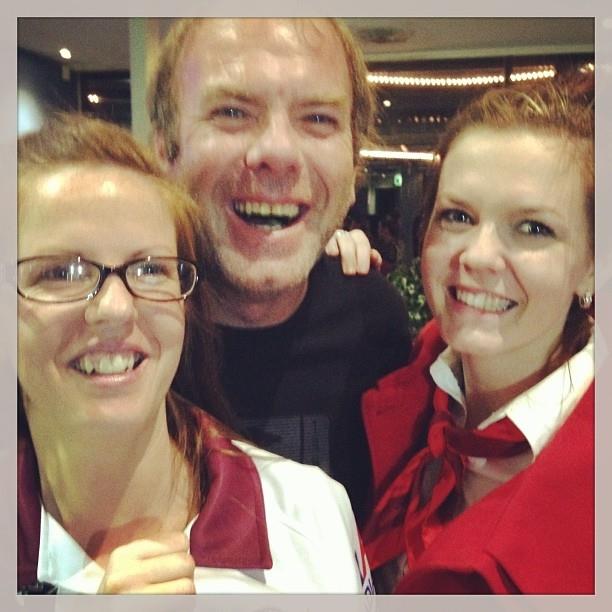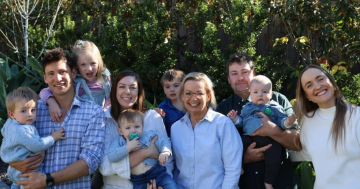
David Degning and his daughters Rachael and Sharon. Photo: Sharon Degning.
Freedom for David Degning has stalled with his appeal against deportation back to the United Kingdom rejected today by Justice Alan Roberston in the Federal Court.
The father and grandfather from Batemans Bay will stay in the Villawood Detention Centre in Sydney for the time being.
His lawyer, Stephen Blanks says Mr Degning and his family are devasted by today’s loss and are considering whether or not to appeal against the decision.
“Here is an Australian family functioning independently, caring for each other, loving each other, a man making his own living as a painter, a man trusted in the community, who have been torn apart by the actions of the Immigration Minister,” Mr Blanks says.
Life for the Degnings was tipped upside down at dawn on January 25 this year when 16 Border Force officers raided the family home and took Mr Degning into custody. Two weeks before, the Minister for Home Affairs, Peter Dutton cancelled Mr Degning’s visa.
Mr Degning arrived in Australia from the United Kingdom at the age of seven in 1968 as a ‘Ten Pound Pom’ with his parents and siblings. For the last 30 of those 50 years, he has earned a living in Batemans Bay, and raised a family with his wife.
According to his family, Mr Degning has voted in elections, interacted with government for all the normal reasons, and has no relationship with the UK, they say Mr Degning considered himself Australian.
The almost 60-year-old is married to an Australian. His two adult daughters are Australian. His son, who tragically died at the age of two, was Australian. His 87-year-old dad took out citizenship after he arrived in the 1960s and is Australian.
Mr Degning’s four grandchildren are Australian, including the most recent addition to the Degning family, a baby boy, who was born last month while his grandfather was locked up in the high-security wing at Villawood.

Prime Minister Malcolm Turnbull and Minister for Home Affairs/Immigration Peter Dutton. Photo: Wikicommons.
All that aside Mr Degning is no saint, which is what prompted the Minister act.
He has a string of offences that include drink driving, assault, and possession of stolen goods that date back to 1977. Worst of all, in 2013 he pleaded guilty to sexual intercourse with a person with a cognitive impairment. The incident in question occurred in 2009. Mr Degning was given a suspended 17-month sentence.
Mr Blanks says, “David served his sentence living in the community on a good behaviour bond. He honoured that bond and was never required to serve any time behind bars.”
Court documents also show that Mr Degning failed to declare his criminal convictions on Incoming Passenger Cards dated January 4, 2004, April 20, 2004, and March 2, 2006, and that Mr Dutton considered “this indicative of a further disregard for the law.”
Mr Degning’s most recent conviction was on September 21, 2015, for drink driving. He was given a seven month suspended sentence on entering a good behaviour bond and lost his license for nine months.
According to Mr Blanks, Mr Degnings wife and daughters stand with their husband and father. His two sisters were in court today to hear Justice Roberston’s decision and it was family who relayed the news back to him in Villawood.
As reported by About Regional in April this year, the Department of Home Affairs and Immigration has declined to comment directly on Mr Degning’s case but has pointed to the powers of the Minister and the Department.
“There are strong provisions under section 501 of the Migration Act 1958 that allow the Minister or a delegate to refuse or cancel a visa if the person is considered to not be of good character,” the spokesperson says.
“A person can fail the character test for a number of reasons, including but not limited to where a non-citizen has a substantial criminal record.”
Mr Degning failed the Minister’s character test on the grounds of his historical crimes and as such should be deported back to the UK in the eyes of the Turnbull Government.
In court, Justice Robertson was able to record the Ministers reasoning in more detail:
“I find that the Australian community could be exposed to harm should Mr Degning reoffend in a similar fashion. I could not rule out the possibility of further offending by Mr Degning. The Australian community should not tolerate any further risk of harm.
“I found the above consideration outweighed the countervailing considerations in Mr Degning’s case, including the best interests of the grandchildren and the impact on his wife and other family members, I have also considered the length of time Mr Degning has made a positive contribution to the Australian community and the consequences of my decision for minor children and other family members.
“In reaching my decision I concluded that Mr Degning represents an unacceptable risk of harm to the Australian community and that the protection of the Australian community outweighed any countervailing considerations above,” Justice Roberston stating the Minister’s reasoning.
Mr Blanks who is also President of the NSW Council for Civil Liberties argued that his client should be allowed to resume life with his family in Batemans Bay as a matter of procedural fairness.
Justice Robertson said he found no “foundation for the submission that the Minister denied procedural fairness.”
“When David pleaded guilty to the 2009 sexual offence, his potential removal from Australia could not be envisaged?” Mr Blanks says.
“Why has this man gone from working in the community and paying taxes one day, to being in the highest security and operationally most expensive immigration detention facility in NSW?”
A successful second appeal now seems the only chance Mr Degning has of staying in Australia.
The family has 28 days to consider their options, otherwise under Section 501 of the Immigration Act he will be removed from the country and deported to his place of birth, a country that has no other significance to him.
He will leave behind his dad who he cares for, his wife, his daughters, and his grandchildren, never to return again to the country he has called home for over 50 years.
“It’s not about whether you like this guy or not. It’s not about defending what he did in 2009. It’s about Australia being the society we say we are,” Mr Blanks says.
“It’s about giving people a fair go, accepting that if you do the crime you do the time, but then you get to move on.
“And it’s about whether we think it’s OK for one minister to decide the fate of so many who make up our community.”
#This story first appeared on RiotACT









